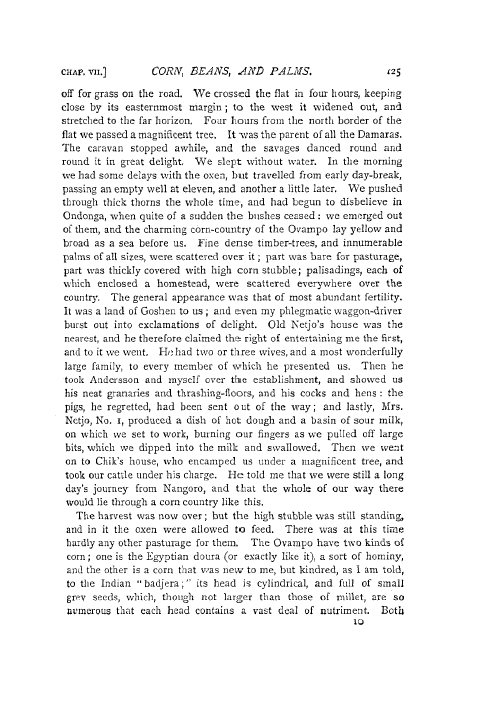| ||||||

OCR Rendition - approximateCRAP. vn.] CORN, BEANS, AND PALMS. 125 off for grass on the road. We crossed the flat in four hours, keeping close by its easternmost margin ; to the west it widened out, and stretched to the far horizon. Four hours from the north border of the flat we passed a magnificent tree. It was the parent of all the Damaras. The caravan stopped awhile, and the savages danced round and round it in great delight. We slept without water. In the morning we had some delays with the oxen, but travelled from early day-break, passing an empty well at eleven, and another a little later. We pushed through thick thorns the whole time, and had begun to disbelieve in Ondonga, when quite of a sudden the bushes ceased : we emerged out of them, and the charming corn-country of the Ovampo lay yellow and broad as a sea before us. Fine dense timber-trees, and innumerable palms of all sizes, were scattered over it ; part was bare for pasturage, part was thickly covered with high corn stubble; palisadings, each of which enclosed a homestead, were scattered everywhere over the country. The general appearance was that of most abundant fertility. It was a land of Goshen to us ; and even my phlegmatic waggon-driver burst out into exclamations of delight. Old Netjo's house was the nearest, and he therefore claimed the right of entertaining me the first, and to it we went. He had two or three wives, and a most wonderfully large family, to every member of which he presented us. Then he took Andersson and myself over the establishment, and showed us his neat granaries and thrashing-floors, and his cocks and hens : the pigs, he regretted, had been sent out of the way; and lastly, Mrs. Netjo, No. i, produced a dish of hot dough and a basin of sour milk, on which we set to work, burning our fingers as we pulled off large bits, which we dipped into the milk and swallowed. Then we went on to Chik's house, who encamped us under a magnificent tree, and took our cattle under his charge. He told me that we were still a long day's journey from Nangoro, and that the whole of our way there would lie through a corn country like this. The harvest was now over ; but the high stubble was still standing, and in it the oxen were allowed to feed. There was at this time hardly any other pasturage for them. The Ovampo have two kinds of corn; one is the Egyptian doura (or exactly like it), a sort of hominy, and the other is a corn that was new to me, but kindred, as I am told, to the Indian "badjera;" its head is cylindrical, and full of small grey seeds, which, though not larger than those of millet, are so nemerous that each head contains a vast deal of nutriment. Both 10 |